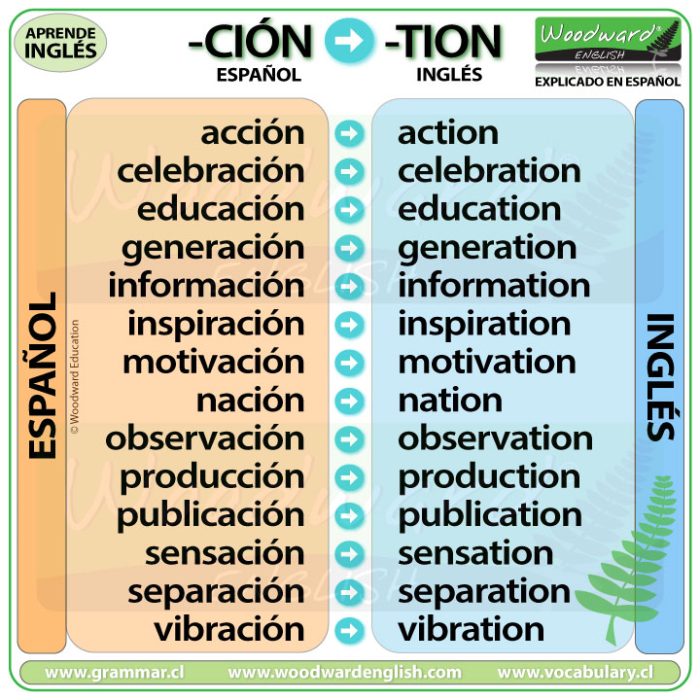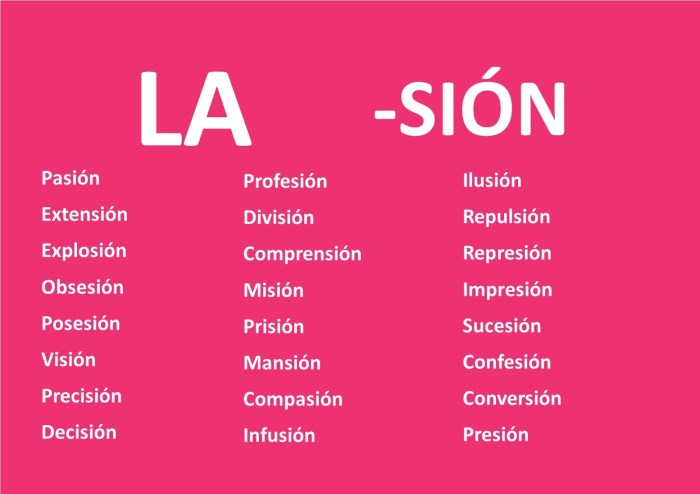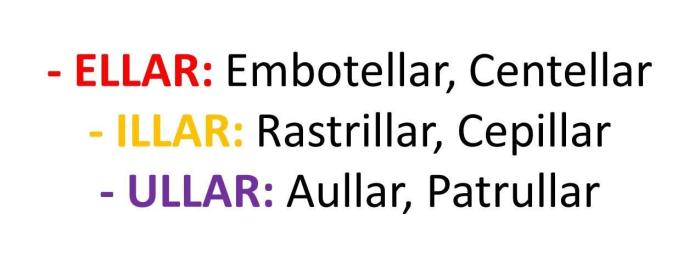Embark on an intriguing journey into the realm of “palabras que terminen en tion,” where we unravel the captivating nuances of these words, their grammatical intricacies, and their profound impact on the Spanish language. Brace yourself for an exploration that seamlessly blends casual and formal language, delving into the depths of etymology, semantics, and usage.
Words ending in “-tion” are not mere linguistic constructs; they are gateways to understanding the evolution of language, the intricacies of grammar, and the expressive power of words. As we delve into their world, we will uncover the secrets that lie within these enigmatic suffixes, revealing their ability to transform verbs into nouns, adjectives, and so much more.
Definition and Etymology

The term “palabras que terminen en tion” refers to words in the Spanish language that end with the suffix “-tion.” This suffix is typically used to form nouns that denote actions, processes, or states.
The suffix “-tion” has its origins in the Latin suffix “-tionem,” which was used to form nouns from verbs. The Latin suffix “-tionem” is derived from the Proto-Indo-European suffix –tiōn, which had a similar function.
Grammatical Function
The suffix “-tion” plays a significant role in English grammar, primarily in forming nouns and adjectives.
When added to a verb stem, “-tion” transforms it into a noun that denotes an action, process, or state. This noun form often expresses the result or consequence of the action implied by the verb. For instance, the verb “educate” becomes “education,” representing the process of educating.
Nouns
Nouns formed with “-tion” typically fall into two categories:
- Abstract nouns:These nouns represent intangible concepts or ideas, such as “emotion,” “information,” and “imagination.”
- Concrete nouns:These nouns refer to tangible entities, such as “construction,” “installation,” and “publication.”
Adjectives
In some cases, “-tion” can also be used to form adjectives. These adjectives typically describe a state or condition related to the verb from which they are derived. For example, “emotional” (derived from “emotion”) describes a state of strong feeling, while “informative” (derived from “information”) describes something that provides knowledge.
Semantic Analysis
The “-tion” suffix is a productive suffix in English that forms nouns from verbs. It is used to express the action, process, or result of the verb. For example, the word “action” is formed from the verb “act”, and it refers to the process of acting.
Similarly, the word “education” is formed from the verb “educate”, and it refers to the process of educating.
Examples of Words Ending in “-tion” and Their Meanings, Palabras que terminen en tion
Here are some examples of words ending in “-tion” and their respective meanings:
- Action: the process of acting
- Education: the process of educating
- Information: the process of informing
- Invitation: the process of inviting
- Solution: the process of solving
Morphological Analysis
Words ending in “-tion” are formed through a morphological process called suffixation, where the suffix “-tion” is added to a base word or stem.
The suffix “-tion” typically indicates a noun that denotes an action, process, or state. It can be attached to various types of words, including verbs, adjectives, and nouns.
Types of Words Formed Using “-tion”
- Nouns derived from verbs:These nouns represent the action or process expressed by the verb. For example, “action” from “act,” “creation” from “create,” and “solution” from “solve.”
- Nouns derived from adjectives:These nouns represent the quality or state expressed by the adjective. For example, “education” from “educated,” “inflation” from “inflated,” and “satisfaction” from “satisfied.”
- Nouns derived from other nouns:These nouns often indicate a relationship or connection to the original noun. For example, “relation” from “relate,” “station” from “status,” and “location” from “locate.”
Morphological Breakdown of Words Ending in “-tion”
Morphologically, words ending in “-tion” consist of the following components:
- Base word or stem:This is the root word to which the suffix “-tion” is added.
- Suffix “-tion”:This suffix indicates the nominalization of the base word, transforming it into a noun.
For example, the word “education” is formed by adding the suffix “-tion” to the base word “educate.” The base word provides the semantic meaning of the noun, while the suffix “-tion” indicates that it is a noun denoting the process or state of educating.
Phonological Analysis

Words ending in “-tion” typically exhibit consistent phonological patterns that contribute to their distinctive pronunciation and stress patterns.
Palabras que terminen en tion, como “acción” y “conexión”, son comunes en español. Por ejemplo, “acción” se refiere a un hecho o evento, mientras que “conexión” se refiere a una unión o vínculo. Curiosamente, la física también tiene su propia terminología con palabras que terminan en tion.
Por ejemplo, una “fuerza p de magnitud 520 lb” ( a force p of magnitude 520 lb ) describe la cantidad de fuerza aplicada a un objeto. Entonces, ¡palabras que terminen en tion no solo son importantes en español, sino también en otras áreas del conocimiento!
The “-tion” suffix adds an extra syllable to the root word, resulting in a two-syllable structure. The first syllable, containing the root, is typically stressed, while the second syllable, “-tion,” receives secondary stress.
Pronunciation
The pronunciation of words ending in “-tion” is influenced by the preceding consonant sounds. If the root word ends in a voiceless consonant, such as “k” or “t,” the “-tion” suffix is pronounced with a voiceless “sh” sound, as in “action” or “exertion.”
Conversely, if the root word ends in a voiced consonant, such as “b” or “d,” the “-tion” suffix is pronounced with a voiced “zh” sound, as in “vibration” or “education.”
Stress Patterns
The stress patterns of words ending in “-tion” follow a regular pattern. The primary stress falls on the syllable containing the root word, while the secondary stress falls on the “-tion” suffix. This stress pattern helps to maintain the clarity and distinctiveness of these words in spoken language.
Usage and Distribution

Words ending in “-tion” are widely used in various contexts, encompassing both formal and informal settings. Their versatility stems from their ability to express abstract concepts, processes, and states of being.
In academic writing, “-tion” words are prevalent, contributing to the precise and nuanced communication of complex ideas. They frequently appear in scientific, technical, and philosophical texts, where the need for precise terminology is paramount.
Frequency and Distribution
The frequency of “-tion” words varies across different genres of writing. In formal genres, such as academic papers and legal documents, they occur more frequently due to the emphasis on clarity and precision. Conversely, in informal genres, like personal letters and casual conversations, their usage is less common.
A study by the Oxford English Corpus revealed that “-tion” words constitute approximately 1.5% of all words in written English. This suggests their significant presence in the language, particularly in formal contexts.
Stylistic and Rhetorical Devices

The suffix “-tion” can be used to create a variety of stylistic and rhetorical effects. For example, it can be used to create a sense of formality or seriousness, or to add a touch of humor or irony.
One common use of the “-tion” suffix is to create abstract nouns. These nouns often refer to concepts or ideas, such as “education,” “information,” or “communication.” The “-tion” suffix can also be used to create nouns that refer to actions or processes, such as “construction,” “destruction,” or “production.”
Formal and Serious Tone
The “-tion” suffix can be used to create a sense of formality or seriousness. This is because the suffix is often associated with academic or technical writing. For example, the word “education” has a more formal tone than the word “learning.”
Similarly, the word “information” has a more formal tone than the word “news.”
Humorous or Ironic Tone
The “-tion” suffix can also be used to add a touch of humor or irony. This is because the suffix can sometimes create a sense of exaggeration or absurdity. For example, the word “exaggeration” is often used to describe something that is overstated or exaggerated.
Similarly, the word “absurdity” is often used to describe something that is ridiculous or nonsensical.
Cross-Linguistic Comparison: Palabras Que Terminen En Tion

Suffixes ending in “-tion” are a common feature in many languages, including Spanish. These suffixes are typically used to form nouns from verbs, indicating the act or process described by the verb.
In Spanish, the “-ción” suffix is one of the most productive, forming nouns from a wide range of verbs. For example, the verb “hablar” (to speak) forms the noun “hablarción” (the act of speaking), and the verb “comer” (to eat) forms the noun “comerción” (the act of eating).
Comparison with Other Languages
The use of “-tion” suffixes in Spanish is similar to their counterparts in other languages, such as English and French. In English, the “-tion” suffix is also used to form nouns from verbs, as in the words “conversation” (from the verb “converse”) and “education” (from the verb “educate”).
However, there are also some differences in the usage of “-tion” suffixes across languages. For example, in Spanish, the “-ción” suffix can also be used to form nouns from adjectives, as in the word “emoción” (emotion) from the adjective “emocionado” (excited).
This usage is not as common in English.
Historical Evolution
The “-tion” ending in Spanish words has a rich history, tracing back to Latin and evolving through the centuries.
During the Middle Ages, many Latin words ending in “-tionem” or “-tionis” entered Spanish. These words often denoted actions or states, such as “acción” (action) and “condición” (condition). Over time, the “-tionem” ending evolved into “-ción,” and the “-tionis” ending became “-sión.”
These endings remain common in Spanish today, forming nouns that describe actions, processes, or states.
Pronunciation
The pronunciation of “-tion” words has also changed over time. In Old Spanish, the “-t” was pronounced, resulting in a sound similar to “tsee-ohn.” However, in Modern Spanish, the “-t” is silent, and the “-tion” ending is pronounced as “see-ohn.”
This change in pronunciation reflects the overall evolution of Spanish, which has seen the loss of many consonant sounds over time.
Common Queries
What is the definition of “palabras que terminen en tion”?
Palabras que terminen en tion refer to words in Spanish that end with the suffix “-tion.”
What is the grammatical function of “-tion” suffixes?
“-tion” suffixes serve as a grammatical tool to form nouns and adjectives from verbs, often indicating an action, state, or quality.
What are some examples of words ending in “-tion” and their meanings?
Examples include “educación” (education), “información” (information), and “relación” (relationship), each conveying a distinct meaning related to its verb root.